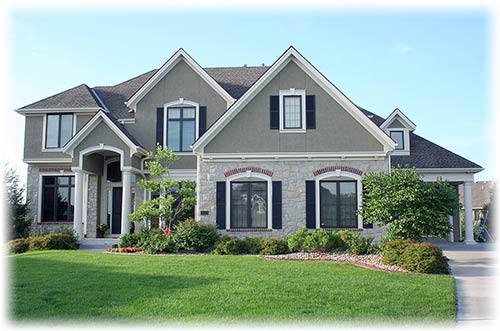home
home [home homes homed homing] noun, adjective, adverb, verb [həʊm] [hoʊm]
noun
HOUSE, ETC.
1. countable, uncountable the house or flat/apartment that you live in, especially with your family
• We are not far from my home now.
• Old people prefer to stay in their own homes.
• She leaves home at 7 every day.
• the family home
• While travelling she missed the comforts of home.
• He left home (= left his parents and began an independent life) at sixteen.
• Nowadays a lot of people work from home.
• I'll call you from home later.
• (figurative) We haven't found a home for all our books yet (= a place where they can be kept).
• stray dogs needing new homes
see also stay-at-home
2. countable a house or flat/apartment, etc, when you think of it as property that can be bought and sold
• a holiday/summer home
• A lot of new homes are being built on the edge of town.
• Private home ownership is increasing faster than ever.
• They applied for a home improvement loan.
see also mobile home, second home, stately home
TOWN/COUNTRY
3. countable, uncountable the town, district, country, etc. that you come from, or where you are living and that you feel you belong to
• I often think about my friends back home.
• Jane left England and made Greece her home.
• Jamaica is home to over two million people.
FAMILY
4. countable used to refer to a family living together, and the way it behaves
• She came from a violent home.
• They wanted to give the boy a secure and loving home.
• He had always wanted a real home with a wife and children.
see also broken home
FOR OLD PEOPLE/CHILDREN
5. countable a place where people who cannot care for themselves live and are cared for by others
• a children's home
• an old people's home
• a retirement home
• a home for the mentally ill
• She has lived in a home since she was six.
see also nursing home, rest home
FOR PETS
6. countable a place where pets with no owner are taken care of
• a dogs'/cats' home
OF PLANT/ANIMAL
7. singular, uncountable the place where a plant or animal usually lives; the place where sb/sth can be found
• This region is the home of many species of wild flower.
• The tiger's home is in the jungle.
• The Rockies are home to bears and mountain lions.
• Arizona is home to the Grand Canyon and the Petrified Forest.
• Beverly Hills is the home of the stars.
WHERE STH FIRST DONE
8. singular the ~ of sth the place where sth was first discovered, made or invented
• New Orleans, the home of jazz
• Greece, the home of democracy
more at charity begins at home at charity, close to home at close2 adj., eat sb out of house and home at eat, an Englishman's home is his castle at Englishman, your spiritual home at spiritual
Word Origin:
Old English hām, of Germanic origin; related to Dutch heem and German Heim.
Thesaurus:
home noun
1. C, U
• My home is very near here.
house • • address • |BrE flat • |especially AmE apartment • |informal place • |formal dwelling • • residence • |formal humorous abode •
at home/sb's house/an address/sb's flat/sb's apartment/sb's place/sb's residence
in a home/sb's house/sb's flat/sb's apartmentsb's place/a dwelling/a residence
have a/an home/house/address/flat/apartment/place of your own
2. C
• 200 new homes are being built in the town.
house • • cottage • |BrE flat • • bungalow • |especially AmE apartment • • townhouse • • condominium • |AmE ranch house •
a detached/semi-detached home/house/cottage/bungalow
a one-/two-/three-bedroom home/house/cottage/flat/bungalow/apartment/townhouse/ranch house
rent a home/house/cottage/flat/bungalow/apartment
3. C, U
• She left England and made her home in Spain.
homeland • • hometown • • birthplace •
a/an beloved/adopted home/homeland/hometown
a tribal/traditional/spiritual home/homeland
return to your home/homeland/hometown/birthplace
4. C
• a child from a secure and loving home
family • • household • • house •
a low-income/poor/high-income/wealthy/rich home/family/household
come from a …home/family
sb's home/family life/background/situation
Collocations:
Decorating and home improvement
Houses
refurbish/renovate/ (BrE) do up a building/a house
convert a building/house/room into homes/offices/(especially NAmE) apartments/(BrE) flats
extend/enlarge a house/building/room/kitchen
build (BrE) an extension (to the back/rear of a house)/(NAmE) an addition (on/to sth)/(BrE) a conservatory
knock down/demolish a house/home/building/wall
knock out/through the wall separating two rooms
Decoration
furnish/paint/ (especially BrE) decorate a home/house/apartment/flat/room
be decorated in bright colours/(especially US) colors/in a traditional style/with flowers/with paintings
paint/plaster the walls/ceiling
hang/put up/strip off/remove the wallpaper
install/replace/remove the bathroom fixtures/(BrE) fittings
build/put up shelves
lay wooden flooring/timber decking/floor tiles/a carpet/a patio
put up/hang/take down a picture/painting/poster/curtain
DIY/home improvement
do (BrE) DIY/carpentry/the plumbing/the wiring
make home improvements
add/install central heating/underfloor heating/insulation
fit/install double-glazing/a smoke alarm
insulate your house/your home/the walls/the pipes/the tanks/(especially BrE) the loft
fix/repair a roof/a leak/a pipe/the plumbing/a leaking (especially BrE) tap/(NAmE usually) faucet
block/clog (up)/unblock/unclog a pipe/sink
make/drill/fill a hole
hammer (in)/pull out/remove a nail
tighten/untighten/loosen/remove a screw
saw/cut/treat/stain/varnish/paint wood
Collocations:
Moving house
Renting
live in a rented/(especially NAmE) rental property
rent/share/move into a furnished house/(BrE) flat/(especially NAmE) apartment
rent a studio/(BrE) a studio flat/(especially NAmE) a studio apartment/(BrE) a bedsit
find/get a housemate/(BrE) a flatmate/(NAmE) a roommate
sign/break the lease/rental agreement/contract
extend/renew/terminate the lease/(BrE) tenancy
afford/pay the rent/the bills/(NAmE) the utilities
(especially BrE) fall behind with/ (especially NAmE) fall behind on the rent
pay/lose/return a damage deposit/(NAmE) security deposit
give/receive a month's/two-weeks' notice to leave/vacate the property
Being a landlord
have a flat/apartment/room (BrE) to let/(especially NAmE) for rent
rent (out)/lease (out)/ (BrE) let (out)/sublet a flat/apartment/house/property
collect/increase/raise the rent
evict the existing tenants
attract/find new/prospective tenants
invest in rental property/(BrE) property to let/(BrE) the buy-to-let market
Buying
buy/acquire/purchase a house/(a) property/(especially NAmE) (a piece of) prime real estate
call/contact/use (BrE) an estate agent/(NAmE) a Realtor™/(NAmE) a real estate agent/broker
make/ (BrE) put in an offer on a house
put down/save for (BrE) a deposit on a house
make/put/save for (especially NAmE) a down payment on a house/home
apply for/arrange/take out a mortgage/home loan
(struggle to) pay the mortgage
make/meet/keep up/cover the monthly mortgage payments/(BrE also) repayments
(BrE) repossess/ (especially NAmE) foreclose on sb's home/house
Selling
put your house/property on the market/up for sale/up for auction
increase/lower your price/the asking price
have/hold/hand over the deed/(especially BrE) deeds of/to the house, land, etc.
Example Bank:
• Andalusia, the home of flamenco
• Fitting a burglar alarm is the most effective way to increase home security.
• He came from an appalling home background.
• He claimed he had bought the cigarettes for home consumption, not to sell them.
• He didn't leave home until he was 24.
• He supplements his income with part-time or home work.
• He used to spend the summer painting at his country home.
• He went missing while on home leave from prison.
• He'd always dreamed of owning his own home.
• Her job means she's away from home for weeks at a time.
• I arranged to meet her in her office, as she seemed more relaxed on her home territory.
• I've tried all the home remedies for headaches without success.
• It's unusual for young people over 25 to still live in the family home.
• Let's go home— I'm tired.
• Make sure you insure your home contents for an adequate amount.
• More and more children in the school are from single-parent homes.
• My grandmother has a home help who comes and cleans twice a week.
• On the home front, the fuel crisis continues to worsen.
• Perhaps we could find a home for the kitten.
• Placing a child in public care is sometimes the only solution to ill-treatment in the natural home.
• Priceless antique furniture was destroyed in the fire at the stately home.
• She desperately missed her home comforts while camping.
• She had never had a stable home life.
• She left her native home in Ireland and went to America.
• She missed her mother's home cooking.
• The banner said ‘Welcome home dad!’
• The course is suitable for classroom or home study.
• The doctor was assaulted on a home visit.
• The first time he visited New Orleans he knew he had found his spiritual home.
• The hill is the legendary home of King Arthur.
• The hotel's friendly atmosphere makes it a real home (away) from home.
• The lock-up garage provides a secure home for your car.
• The mudflats offer a winter home to thousands of migrating swans.
• The newspaper gives priority to home news over international news.
• The people abandoned their homes and headed for the hills.
• The show gives home-grown musical talent the chance to show what they can do.
• The storm wrecked the family's caravan home.
• The team are playing away from home.
• The team's home form has slumped in recent weeks.
• These birds are in danger of becoming extinct as their forest home disappears.
• These children badly need a stable and secure home life.
• They also have a holiday home in Spain.
• They also have a weekend home in the Catskills.
• They are a difficult team to beat on their home ground.
• They designed and built their own home.
• They found their dream home on the shore of a lake.
• They hope to sell as many computers on the home market as they export.
• They run a retirement home for the elderly.
• This computer is marketed for home use.
• Try calling me on my home number after six o'clock.
• We are offering a free 15-day home trial on our software.
• We have a home movie of my dad teaching me to swim.
• We have to provide a good home for the children.
• Work begins this week on a purpose-built home for the city's homeless.
• a laser printer aimed at the home user
• a shelter for people with no permanent home
• a temporary home for the paintings
• children from a broken home
• home-grown vegetables
• home-made bread
• seamen serving in home waters
• the market for home entertainment systems
• the party's spokesman for home affairs
• A family of four was rescued early this morning when fire ripped through their terraced home.
• Eventually she had to give up her house and go into a nursing home.
• He refused to give up his house and garden and go into a retirement home.
• His children were upset when he sold the family home.
• I had always thought of India as my spiritual home.
• I often think about my friends back home.
• I'll call you from home later.
• Juliet left England and made Spain her home.
• My grandmother moved into an old people's home two years ago.
• Nora's parents lost custody, and she was placed in a children's home.
• Nowadays a lot of people work from home.
• She comes from a broken home.
• She had to move to a residential care home when her health deteriorated.
• She left home and began an independent life at sixteen.
• She made her home in Spain.
• The centre provides an adoption programme for pets needing new homes.
• The tiger's home is in the jungle.
• We bought a holiday home in France.
• We haven't found a home for all my father's books yet.
Idioms: at home ▪ away from home ▪ bring home the bacon ▪ bring something home to somebody ▪ come home to somebody ▪ hit home ▪ home and dry ▪ home from home ▪ home is where the heart is ▪ home sweet home ▪ set up home ▪ something comes home to roost ▪ when he's/it's at home
Derived: home in on something










